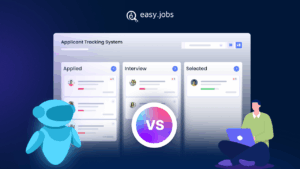The rulebook for finding and hiring great talent is being completely rewritten. The old ways of placing candidates are quickly becoming a thing of the past, replaced by new technologies and fresh ideas.
For recruitment agencies, simply keeping up is no longer enough. You have to stay ahead to succeed. Understanding the latest recruitment trends is not just a good idea. It is essential for survival in today’s competitive market.
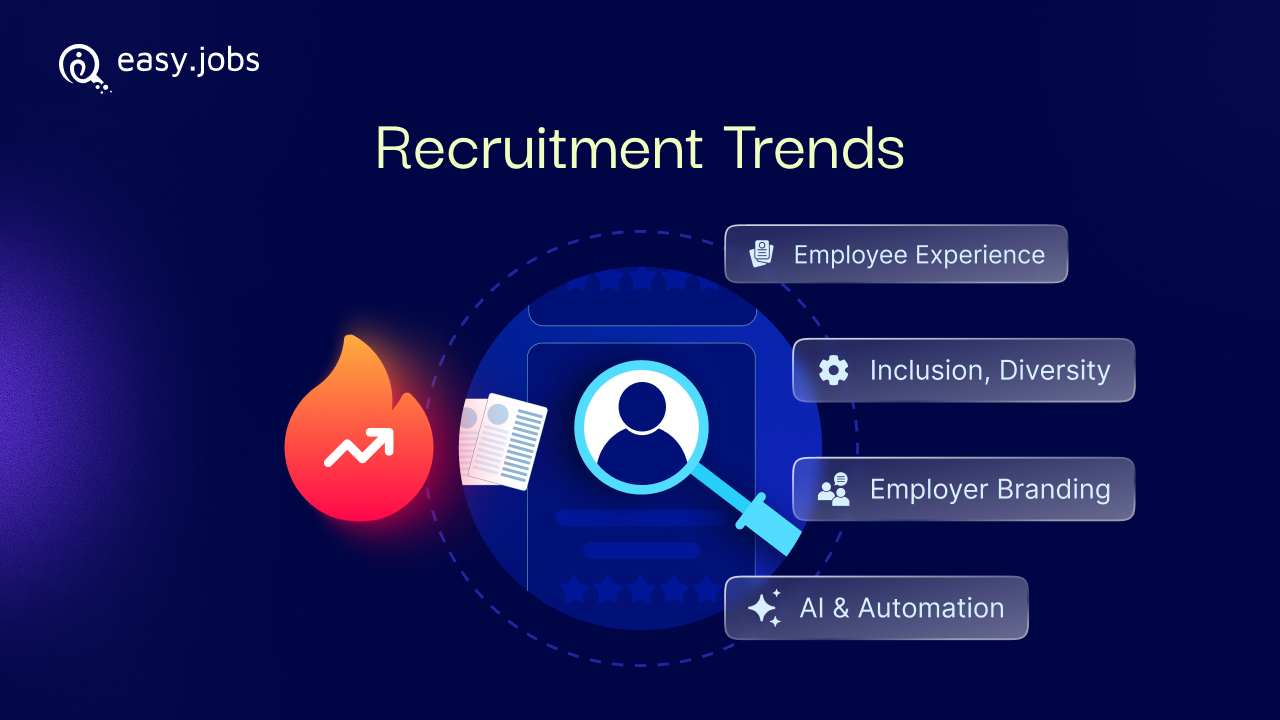
In this guide, what to do next. We will take a deep dive into the most important and impactful trends for 2025. From artificial intelligence to a stronger focus on skills, we will show you what will define the future of recruitment and how your agency can prepare to lead the way.
Why Recruitment Trends Matter in 2025
Recruitment trends shape agency success by revealing shifting job seeker expectations, new technologies, and smarter hiring strategies. As the market evolves rapidly, agencies that adapt stay competitive, attract top talent, and strengthen client trust. Embracing these trends empowers agencies to make better decisions and secure a strong position in the changing recruitment landscape.
In 2025, agency competitiveness is no longer about filling roles fast. It requires awareness of how recruitment trends influence talent acquisition and retention. Embracing methods like skills-based hiring and predictive analytics reduces mismatches, boosts employee satisfaction, and ensures lasting placements. This approach not only improves outcomes but also builds stronger trust with clients who prioritize quality hires.
Global factors heighten the importance of recruitment trends. Remote hiring expands talent pools but adds complexity. Generational shifts, with Gen Z rising, demand fresh engagement strategies. Economic uncertainty challenges agencies to balance cost efficiency while still attracting and securing highly skilled candidates essential for long-term growth and success.
By staying on top of these recruitment trends, agencies can remain relevant, build stronger client trust, and ensure sustainable growth in a rapidly shifting market.
Key Recruitment Trends Redefining How Agencies Hire And Retain Talent
Recruitment is entering a new era in 2025. The way agencies source, evaluate and engage talent is shifting faster than ever before, driven by technology, changing workforce expectations and global challenges. To stay competitive, agencies must go beyond traditional methods and embrace the strategies that are reshaping the industry.
The following recruitment trends highlight the most powerful changes you need to understand and apply if you want to attract, place and retain top talent in the year ahead.
1. AI & Automation: Your Agency’s New Strategic Partner
Artificial Intelligence and Automation are no longer just buzzwords from the future. They are now at the very heart of modern recruitment. For agencies looking to stay competitive, embracing AI & automation is one of the most critical recruitment trends to follow.
These tools have moved beyond simple helpers to become strategic partners that can transform how you find and place talent. Find ATS platforms with AI features that will ease your recruitment process.
The most immediate benefit is taking over the repetitive, time-consuming tasks that can bog down a recruiter’s day. Imagine screening thousands of resumes in minutes to find the top 10 candidates, or having an intelligent system automatically schedule interviews with everyone involved.
By automating this high-volume work, AI & automation free up your team from administrative headaches. In the image below, you can find the modern recruitment funnel using AI & its impact.
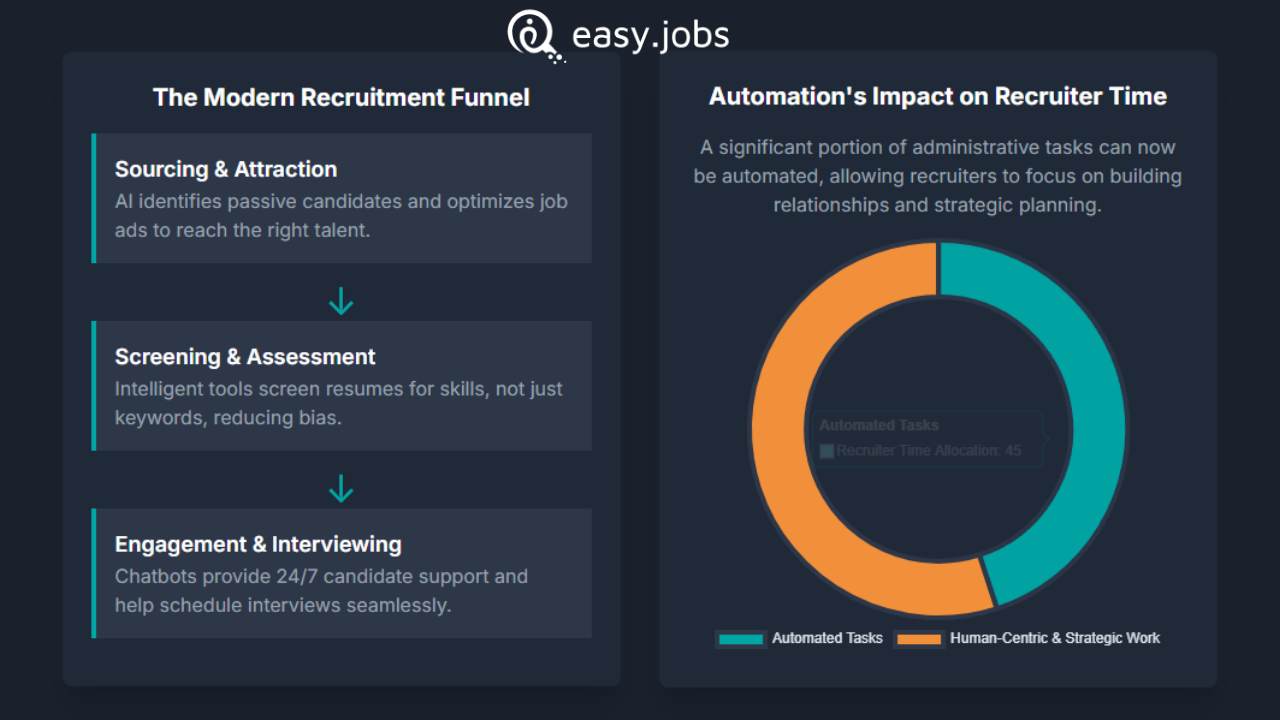
But their power goes much further than just managing tasks. AI-powered tools can provide deep, data-driven insights that lead to smarter hiring decisions. Here are a few examples of how they work:
- Chatbots: These can engage with candidates on your website 24/7, instantly answering common questions about a role or your agency, ensuring no potential star candidate is left waiting.
- Programmatic Job Advertising: Instead of guessing where to post a job ad, these tools automatically place your ads on the websites where the right candidates will see them, optimizing your spending and reach.
- AI Sourcing Tools: These powerful systems can scan the internet to find “passive candidates” talented professionals who aren’t actively looking for a job but would be a perfect fit for your client.
Accordinf to Daniel Shapero, LinkedIn’s COO, puts it simply: “All of these [admin tasks] are actually quite appropriate for AI to handle, so that recruiters can spend more time on the human parts of the job.”
Ultimately, the goal of AI is not to replace recruiters. It is to empower them. By letting technology handle the data and the routine tasks, your recruiters can focus on the irreplaceable human side of their job: building strong relationships, understanding a client’s culture and connecting with candidates on a personal level.
2. Skill-Based Hiring – Potential Over Pedigree
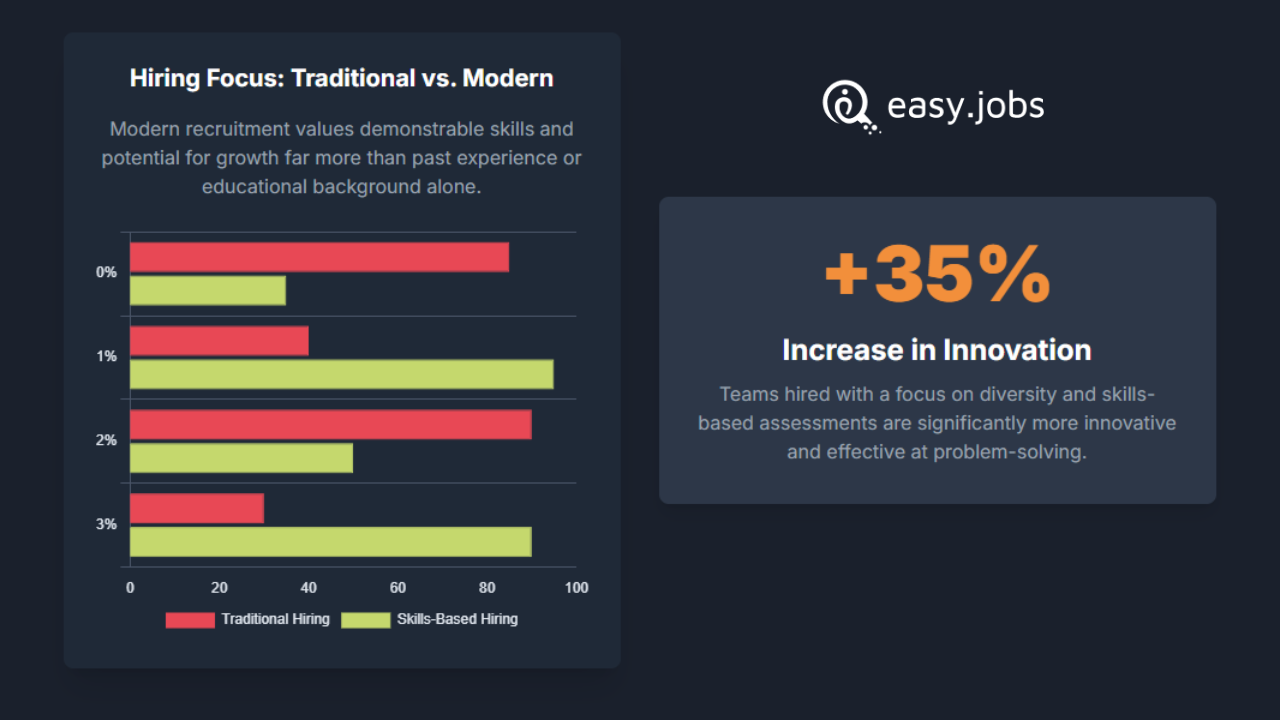
Skills-based hiring is quickly replacing traditional methods that rely heavily on degrees and job titles. This approach focuses on what a candidate can do rather than where they studied or who they worked for. This shift is gaining momentum for several reasons:
- It widens the talent pool by opening doors to non-traditional candidates.
- It helps close skills gaps that degrees alone cannot measure.
- It improves diversity by focusing on ability, not pedigree.
According to LinkedIn Benelux “Future of Recruiting 2025” report “AI is reshaping hiring from the ground up… generative AI is speeding up the hiring process, allowing recruiters to spend more time on … improving candidate experience … and advising hiring managers.”
This underscores how skill and fit matter more than pedigree. Agencies can implement Skills-Based Hiring in several ways:
- Pre-hire assessments: Technical, cognitive, and situational tests give you measurable insights.
- Work-sample projects: Case studies and simulations reveal how candidates solve problems.
- Competency-based interviews: Focus questions on skills and practical knowledge instead of background.
This approach not only delivers fairer recruitment but also improves long-term success. Hires made on proven skills are more likely to thrive and stay in their roles. For agencies, this is a powerful way to deliver better outcomes for clients and to stand out in a competitive market.
3. The Candidate-Centric Revolution – Elevating the Employee Experience
Recruitment today is not a one-way process. Candidates are interviewing companies just as much as companies are interviewing them. That means employee experience starts before the first day on the job.
A strong experience during recruitment sets the tone for future engagement and retention. Agencies that prioritize this will not only win top talent but also build stronger reputations. Key components of an exceptional Employee Experience include:
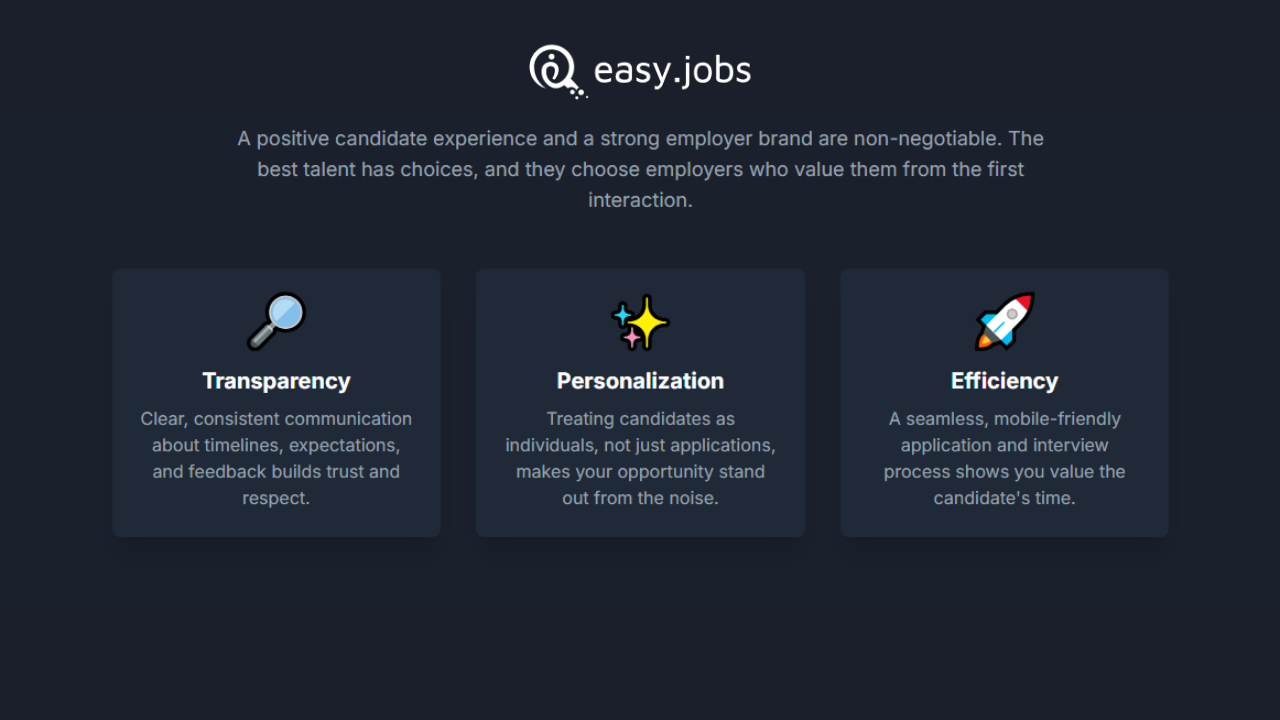
- Transparency: Be clear about timelines, processes, and feedback.
- Personalization: Treat candidates as individuals, not numbers.
- Efficiency: Ensure your process is simple, fast, and mobile-friendly.
According to Senior Product Marketing Manager of NetSuite’s “Recruiting Trends That Are Shaping 2025” “Candidate experience makes the role of the recruiter even more valued. The demand for recruiting professionals has significantly increased, and the fastest growing skills for recruiters are related to decision‑making and HR strategy.”
That reinforces why candidate experience matters more than ever.
A poor experience can cause serious harm. It can damage your employer brand, spread through negative reviews, and push great candidates toward competitors.
To improve, agencies can invest in candidate relationship management tools, streamline application workflows, and provide real-time communication. Prioritizing Employee Experience is one of the most impactful recruitment trends for 2025.
4. Strategic Employer Branding – More Than a Mission Statement
Employer branding is no longer a nice addition. It is a core part of the recruitment strategy. In the context of agencies, Employer Branding is about showcasing the value of working with your agency and with your clients.

A strong brand works like a recruiter that never sleeps. It attracts talent, builds trust, and ensures that candidates align with company culture. Agencies can help clients develop this through:
- Writing compelling job descriptions that reflect culture and values.
- Sharing employee stories and insights on social media.
- Managing online reviews on platforms like Glassdoor.
The key is authenticity. Candidates can spot exaggeration, so highlighting real employee experiences will always resonate more. A strong Employer Branding strategy is one of the recruitment trends that can secure top-tier candidates in 2025.
5. Championing Diversity, Equity & Inclusion As A Core Strategy
Diversity, Equity, and Inclusion (DEI) has evolved from a workplace initiative into a fundamental driver of organizational success and resilience. In 2025, the focus is shifting from performative gestures to authentic, measurable actions that cultivate a true culture of belonging. This commitment is essential for building innovative teams where everyone can thrive.
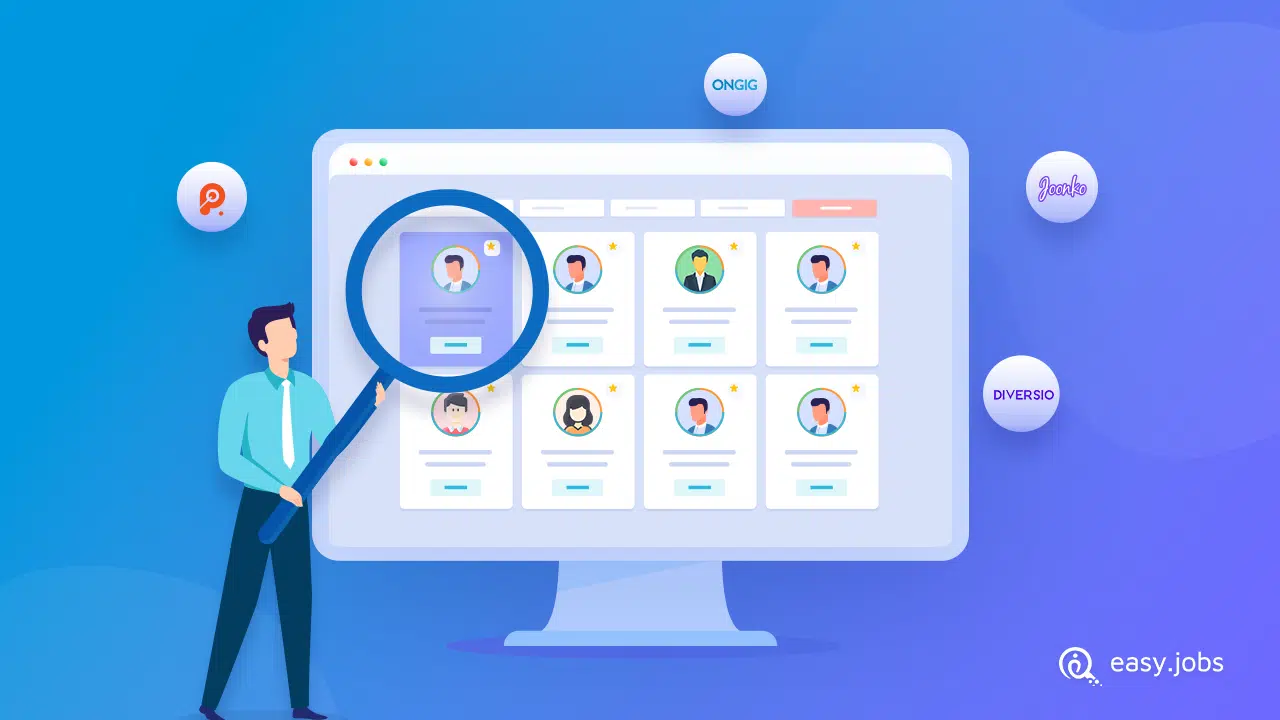
Agencies are uniquely positioned to lead this transformation by embedding equity into the heart of their talent lifecycle:
- Mitigating Bias with Technology: Implement equitable hiring technologies, such as blind skills assessments and anonymized resume reviews, to ensure every candidate is evaluated on their qualifications and potential, free from unconscious bias.
- Crafting Inclusive Job Descriptions: Use welcoming and accessible language in all job postings to attract a diverse spectrum of talent. Focus on core competencies and growth potential rather than overly specific or exclusionary criteria.
- Building Authentic Talent Pipelines: Move beyond simple sourcing to proactively build genuine, long-term relationships with professional networks and communities that have been historically underrepresented in the industry.
- Empowering Leaders with Ongoing Education: Provide continuous learning opportunities for recruiters and hiring managers focused on cultural competency, inclusive leadership, and strategies to interrupt bias in decision-making.
A workforce rich in diverse perspectives and experiences is a catalyst for creativity, enhanced problem-solving, and superior business outcomes.
According to article from The Work-Life Equation in LinkedIn “Nearly 75 % of Indian recruiters are now allocating up to 70 % of their hiring budgets toward AI‑driven recruitment tools and platforms.” This shift can enable more inclusive, bias‑free hiring when managed thoughtfully.
By integrating DEI principles into every stage of the recruitment process, agencies not only align their actions with their values but also gain a significant strategic advantage. This commitment will be a defining characteristic of high-performing and forward-thinking agencies in 2025 and beyond.
6. The Predictive Power of Data – AI-Powered Predictive Analytics
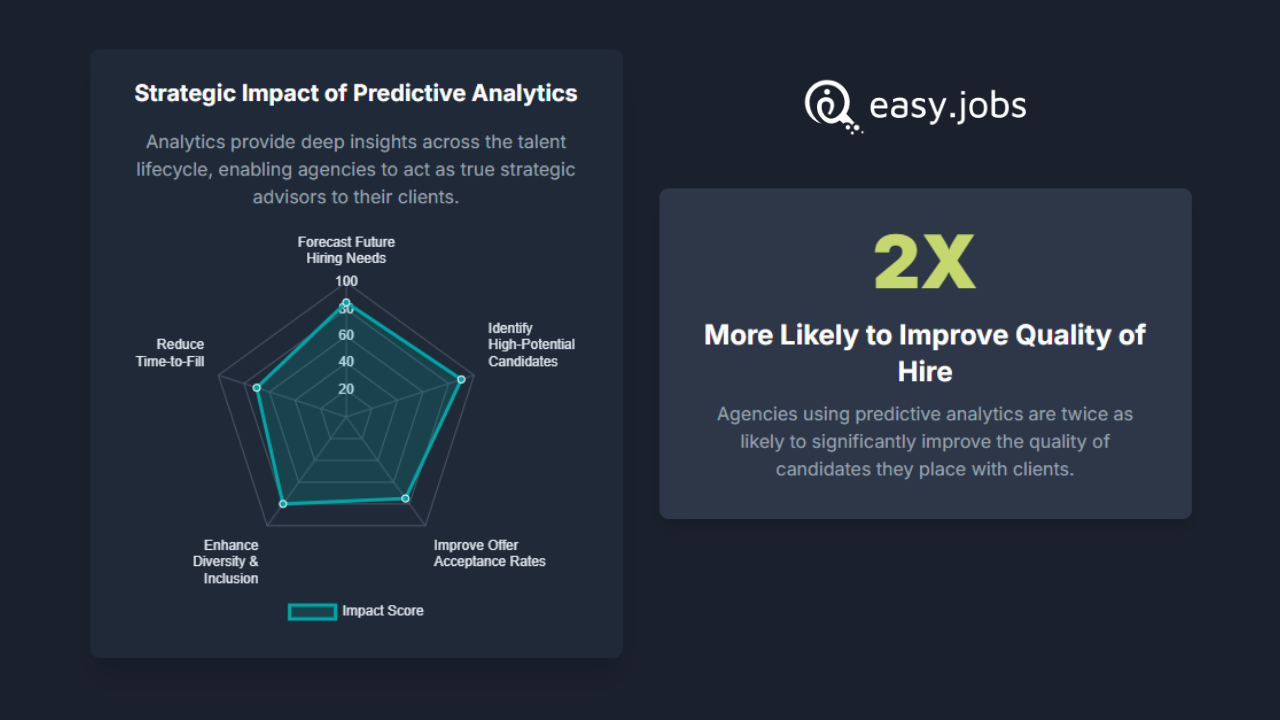
AI-Powered Predictive Analytics is the next frontier of recruitment technology. Instead of reacting to hiring needs, agencies can use data to anticipate them. These tools analyze large datasets to forecast outcomes such as:
- Which candidates are most likely to accept an offer.
- Future hiring needs based on client growth and industry trends.
- The attributes of past successful hires to refine future searches.
By adopting this approach, agencies can shift from being recruiters to becoming strategic talent advisors. This level of foresight allows you to guide clients proactively rather than reactively. Predictive analytics makes recruitment smarter, faster, and more strategic. As one of the cutting-edge recruitment trends, it will give agencies a clear competitive edge in 2025.
Thrive in the Future of Recruitment with Trends that Matter
The future of recruitment belongs to agencies that stay agile, tech-savvy, and human-centric. You have seen how recruitment trends like AI & Automation, Skills-Based Hiring, Employee Experience, Employer Branding, Inclusion, Diversity & Fairness, and AI-Powered Predictive Analytics are shaping the industry.The agencies that succeed will be the ones that embrace these changes and act on them. Now is the time to evaluate your processes, adopt new tools, and rethink your strategies. By doing so, you will not just survive the future of recruitment. You will lead it.
If you liked this blog, Subscribe to our blog and get fresh ideas, tools and strategies that will help you hire smarter and build stronger teams. Join our Facebook-fellesskapet to connect with HR professionals and business leaders seeking to solve similar challenges.


